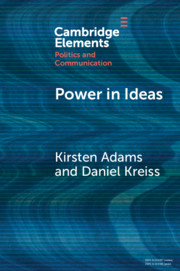Element contents
Power in Ideas
Published online by Cambridge University Press: 08 April 2021
Summary
Information
- Type
- Element
- Information
- Online ISBN: 9781108950954Publisher: Cambridge University PressPrint publication: 13 May 2021
References
Accessibility standard: Unknown
Why this information is here
This section outlines the accessibility features of this content - including support for screen readers, full keyboard navigation and high-contrast display options. This may not be relevant for you.Accessibility Information
- 14
- Cited by
